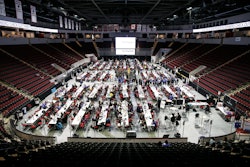
David Adler (@DavidAdler) is the C.E.O. and founder of BizBash.
At BizBash, we have been studying the event industry ecosystem for almost two decades. We sell a product that most people don’t know they need until they need it. These eight factors are fundamental to training any sales team in the event marketplace. Events, meetings, incentives, conferences, trade shows, and training forums are now the town squares where people extend their digital experiences to create true value relationships, effective learning, and build both intellectual and social capital.
With the changes in media and rise of Instagram and other social networks, marketing to the buyers of event and meeting services has gotten harder and more demanding. A pretty photo on Instagram will only go so far to convince a brand, company, or organization to book an important event. Here are points that every venue or supplier needs to know about reaching decision makers today.
1. It’s about event teams.
Marketing to other partners (vendors and venues) is as important as reaching the end buyer or client. The best influencers are other vendors and partners who make recommendations to clients and participate in both formal and informal team structures.
2. It’s about the power of events as a strategy.
Event-related activities are now 20 percent of marketing expenditures, and smart planners are being given a seat at the strategy table because C.E.O.s, C.M.O.s, and C.R.O.s are now embracing them. Smart C-level executives understand how to use events to make change.
3. It’s about planting seeds.
Most event organizers may not have a clear picture of how many and what type of events they will plan when they look at marketing for venues and suppliers. That is why it is important to arm them with intelligence that allows them to reach back into their memory banks to draw on past experiences to stimulate ideas.
4. It’s about understanding social physics.
Stimulating conversations and sharing ideas impacts what to do, whom to hire, and where to host an event. Understanding how ideas flow helps clients plan and execute better events. Social physics is the study of everything from the human interaction to creating the cues to stimulate interaction.
5. It’s about letting them discover you.
Event organizers do their research before contacting a venue or supplier, and they are more open to communicating via digital methods. The next steps involve a site inspection or product investigation. Marketing needs to be idea driven. It’s not just about a logo or a picture, but what you do and how you produce value for a client that can’t be achieved by your competitor.
6. It’s about the hidden planner.
For offices without dedicated event teams, people assigned to execute events are not experts. But they become the go-to people in their organizations and are quickly evolving into the next generation of planners. BizBash has a 20-year history of proven discovery via content on digital platforms. When they need to go to search for venues and suppliers they end up on BizBash.com.
7. It’s about creating presence with brilliant visuals.
Buying event services now depends on visual presentations. Even small enterprises can compete and are evaluated more favorably with a great digital identity. Recognition is gained when you present value in a gripping and illuminating way.
8. It’s about helping planners be experts even when they’re not.
Seventy percent of event organizers plan outside their markets, so trust in their source of information is vital to ensure they are making the right decision. BizBash provides quick intelligence to give hidden planners the confidence they need to make thoughtful buying decisions when hosting events in markets unfamiliar to them.



















